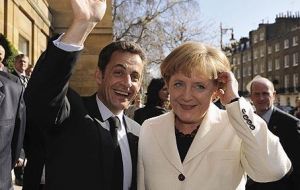MercoPress. South Atlantic News Agency
Sarkozy and Merkel pledge to support the Euro and solve EU debt crisis
 The French president and Angela Merkel smile to boost confidence
The French president and Angela Merkel smile to boost confidence France and Germany pledged on Thursday to work together to solve a European debt crisis and support the Euro, patching up a public rift that had rattled markets around the world.
The unity pledge came as Germany's parliament prepared to vote on Friday on approval of the country's share of a 750 billion Euro rescue for Euro zone countries in financial trouble.
“I told Angela Merkel ... that we cannot have disagreements between Germany and France about subjects of this importance“ President Nicolas Sarkozy told reporters during a joint news conference with British Prime Minister David Cameron at the Elysee Palace.
France and Germany, co-founders of the Euro, had clashed over a unilateral German ban on some speculative trades that on Wednesday scared markets and sent the currency tumbling to a four-year low beneath 1.22 US dollars.
But the Euro rebounded sharply above 1.25 on Thursday, and a German spokesman said Chancellor Merkel and President Sarkozy had agreed to cooperate on Euro-zone growth strategies and coordinate their positions on world financial rules at a G20 summit next month.
Germany and France have long been at odds over how to handle Greece's debt crisis, and their unity pledge did not prevent US and European stocks from falling or oil from hitting an eight-month low. Markets also worried that deep spending cuts and tax hikes would slow European growth and possibly derail a fledgling global recovery.
In Washington, US Federal Reserve Governor Daniel Tarullo warned that failure to contain Europe's problems could freeze markets and launch a replay of the 2008 financial market meltdown.
China also said the crisis was adding to uncertainty, as underlined by weakness in its own stock market.
Earlier, Sarkozy said France would enshrine in its constitution a commitment to cut the country's budget deficit. a move aimed at reassuring markets and placating Berlin. ”This reform will oblige each government coming out of an election to engage in a five-year path dealing with the deficit,“ Sarkozy said.
The French president also underlined he was ”happy to work hand in hand“ with British PM Cameron, who was in Paris on his first visit abroad as prime minister.
For his part, Cameron said, ”I think we were right not to join the Euro and I think we're right to stay out of the Euro.“
But, noting that 60% of Britain's trade is with Europe, he said it is in Britain's interest that the ”Euro zone“ economies recover and that the Euro succeeds.
Cameron called for the European Union to address its budget deficits. ”This is not an alternative to economic growth; we think it's an important part of getting that economic growth,“ he said. ”The greatest risk, I believe, to our economies is inaction on our deficits




Top Comments
Disclaimer & comment rulesCommenting for this story is now closed.
If you have a Facebook account, become a fan and comment on our Facebook Page!